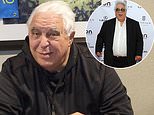'I was a secret mistress for 42 years': He was the only lover she ever had — and she never once asked him to leave his wife
When you’re a mistress, certain skills become ingrained: duplicity, discretion, patience and a capacity for secrecy are prerequisites. And I became consummate in my mastery of all four. But I was never any good at keeping a straight face.
My adulterous liaison with John Prebble, a successful author, screenwriter and married father of three, began in 1952, and we became adept at employing strategies to ensure our deception was never discovered.
John wrote the screenplay for the war film Zulu, starring a young Michael Caine, and in 1964 it was released in London to huge critical acclaim. As John’s mistress I could not attend the premiere in Leicester Square — that honour went to his wife, Gail — but he and I did sneak off to see the film covertly at a more obscure cinema later that week.

John and Jan Prebble, whose affair began in 1952 and lasted 42 years
John was, as ever, enjoying the mischief that anonymity afforded him. ‘Rubbish screenplay,’ he observed audibly on several occasions, until the man sitting behind him tapped him sharply on the shoulder and asked him if he was so clever, why hadn’t he written it himself?
I loved the complicity of such shared moments of fun with John: our relationship was marked by farce and madness, and on that and many other occasions, I failed to subdue my giggles.
John was a wonderful companion. He was witty, erudite and romantic, and for almost half a century we shared a love affair that never waned in its intensity or lost its fervour.
I was John’s mistress for 42 years and his wife for six, and when he died of Parkinson’s disease in 2001, I became his widow. He was my only lover and I adored him, and if mistresses have a right to call themselves dignified, I hope I warrant the description.
I never asked John to leave his wife, neither did I feel a shred of resentment that he didn’t. Their family life in Kingswood, Surrey, was separate and distinct from my illicit life with him in London. I never asked about Gail either — I subdued my curiosity — and although I felt guilt, I consoled myself that she was never hurt because she remained unaware of my existence.
I wasn’t proud of my behaviour — neither did I expect anyone to approve of it. I respected John’s right to another life, and Gail, an artist, had been part of that for more than 15 years before I intruded on it. I was the interloper. Moreover, Gail had given John three children, of whom he was immensely proud and fond.

I never asked John to leave his wife, neither did I feel a shred of resentment that he didn’t
So John set out the conditions for our relationship at the start: he told me that he and Gail got married when she became accidentally pregnant with their first child, and that he’d promised not to desert her. He intended to honour that commitment. So he did not marry me until six months after Gail died in 1993, and even then the truth about our long, secret affair didn’t emerge.
So it may seem perverse — disloyal, even, to John’s memory — that I am now for the first time telling our story, here and in my book Forty Two Years A Secret Mistress. But the fact is John wanted me to. For 20 years I was a journalist; writing is my métier. And both of us knew I had an extraordinary tale to tell.
It began in Fleet Street, where we first met in December 1951. I was working as a reporter for the now defunct Sunday Dispatch; the only woman in a testosterone-fuelled newsroom. John arrived from a rival newspaper: he was tall, slim, good-looking and charming, but I cannot pretend that we instantly fell in love.
As a gesture of friendship, I invited him out for lunch with another colleague that first day. I was 25, rather plain and very enthusiastic about my job; he was 38, the published author of four books and resolutely married.
Our friendship grew. John was knowledgeable, interesting and fun; before long, I was helplessly smitten.
We first slept together on October 16, 1952, and we called it our ‘non- wedding day’, but we did not fall spontaneously into bed.
Everything was planned, considered. John told me he would never divorce, and I accepted the proviso that was to shape the next 42 years of my life.
John booked a little hotel in the Cotswolds but a farcical turn of events scuppered our plans to spend our first night together there. Having checked in, we were shaken to see swarms of reporters — many of them our colleagues — gathered outside.
For one giddy moment I wondered if they were pursuing us, but it emerged that a child had gone missing in the village and they had converged there to cover the story.
So we slunk away unnoticed, and drove back to London. I lost my virginity that night in the narrow bed in my Earl’s Court bedsit. We whispered our endearments so the housekeeper would not know I’d breached the terms of my tenancy by inviting a man into my bed, and we toasted the milestone with revolting ginger wine — pretending it was the champagne we had planned to have at the hotel.
Thereafter, each year, we celebrated our ‘anniversary’ with ginger wine.


He proposed to me in the car park at Dorking North railway station — reasoning that a memorably unromantic venue would provide humour for my future book — and we were married at Marylebone Register Office in April 1994. I was 66, John 78, and we were as ardently, irredeemably and completely in love as ever
That first physical encounter was wonderful. And sex got better and better as I became less shy and more proficient, and although there are couples who contend that lust dies after a couple of years, for me it never did.
There was always a heart-stopping moment of desire and excitement when John arrived, and once we had evolved a modus operandi for our affair, we found we could spend blissful afternoons, as well as snatched hours of the night, making love.
Our affair began in an era long before it was acceptable for an unmarried couple — let alone an errant husband and his lover — to book a double room in a hotel. However, John’s research on his books about Scottish history, for which he became renowned, gave us the perfect opportunity to escape together on trysts.
We travelled as Mr and Mrs Wood — his mother’s maiden name — and as we chatted with fellow guests in hotel bars and lounges, conversation often turned to the history of the area. ‘You must read John Prebble’s books,’ John was often told.
Duly he would nod and promise to do so. But on one occasion a fellow guest got his facts wrong. ‘The Battle of Culloden was fought in blinding snow,’ he informed John, who had written a book on the subject. ‘And if you don’t believe me, you should read John Peeble’s book.’John politely suggested he was wrong about the snow and the author’s surname. ‘Humph,’ grunted the know-all. ‘Read the book and you’ll see I’m right. You can borrow it from your library.’
Being unable to suppress my amusement, I made a dash for the door. I had to do the same thing three more times that evening in the bar of our favourite hotel, Tullich Lodge at Ballater, and a fellow guest, seeing me leave so hurriedly and often, feared I must be suffering from an upset stomach, and offered me some medicine.
By the Sixties I was working for the Mail as its first female Diary editor, and John — by then an established author — worked freelance. His frequent research trips to the British Library were the perfect cover for us. He’d come to my flat, we’d have lunch on my day off, then fall into bed.
John also affected bouts of insomnia. He would pretend he could not sleep so he could leave his marital home in the early hours of the morning, drive over to my flat and join me in bed for a few hours. Our encounters were more passionate because they were secret and hurried. Gail, it seems, was not suspicious of John’s nocturnal wanderings.
My mother, too, did not suspect my affair, and she relinquished hope that I would settle down and marry. My father, a journalist-turned-PR, who had a roving eye himself, did suspect. But he liked John and preserved a judicious silence.
John was an inveterate romantic. He bought me a collection of heart-shaped jewellery. He wrote me glorious letters. Today they fill a suitcase, eight box files, four shoe boxes and my heart. But we also endured times of crushing sadness, most notably in the Sixties when I accidentally fell pregnant twice.
John and I agonised over whether we should keep the first baby, but concluded it would be madness. I would lose my job, and illegitimacy was still a matter of deep and abiding shame. So John paid for my illegal abortion at a clinic that masqueraded as a dentist’s surgery.
Then, a couple of years later, it happened again. I remember wanting to die. John wondered if we shouldn’t throw caution to the wind this time and have the baby. He said he’d love to have a child by me. He fantasised about what the child would be like. But I could see only the distress and disruption it would cause. So again, my pregnancy was ended.

John set out the conditions for our relationship at the start: he told me that he and Gail (right) got married when she became accidentally pregnant with their first child, and that he’d promised not to desert her
When it was all over, John gave me two charms for a bracelet he’d bought me. They were the letters B and G for the boy and girl we never had. Then we tried to think of names we might have given them. Bertrand? Gertrude? Although we tried to mask our sorrow with flippancy, I think still about the children John and I might have had, and I have to close my mind to the wistfulness and yearning.
Every mistress endures, too, empty days of loneliness — hours when they wait fruitlessly for phone calls from their lover. In the era before mobiles, it was tricky for John to secure time for a covert conversation, and I often just longed to hear his voice.
But my job was a solace. It was exciting and absorbing and I was too busy to fritter away time on introspection or self-pity.
In the Seventies I moved into a flat in Pimlico — I live in the same block today — and busied myself working as a tenants’ representative. I took on other voluntary work, too, as a custody visitor monitoring prisoners’ rights and as a helper in soup kitchens. So when John was with his family at Christmas — a mistress’s most lonely time — I was occupied, serving turkey to the friendless and dispossessed.
By then I was working for Capital Radio as its PR, and I offered to work Sundays. The lieu day I took in the week allowed John and I to escape to a love nest — my holiday cottage, the staff quarters of a large country house by the coast in West Wittering, Sussex — where we would spend gloriously indolent afternoons making love.
‘Why are you always so tired?’ asked the house owner’s son, a small boy of seven or eight. ‘Every time you come here the curtains close and you go to bed.’
So my love affair with John continued, much as Prince Charles and Camilla’s did — discretely and passionately. And, perhaps ironically, I moved to a job with the Prince’s Youth Business Trust, publicising this branch of his charity.
But then in autumn 1993, everything changed when Gail died. It would be wrong not to admit that even in the depths of his grief, part of John was also celebrating. ‘Everything will change wondrously,’ he told me.
He proposed to me in the car park at Dorking North railway station — reasoning that a memorably unromantic venue would provide humour for my future book — and we were married at Marylebone Register Office in April 1994. I was 66, John 78, and we were as ardently, irredeemably and completely in love as ever.
John’s teenage grandson, Casper, was his best man, and the family had no suspicion of our affair.
Our six years together thereafter were nothing short of blissful. I never tired of caring for John and, although I feared we might become bored in each other’s company all the time, we never did.
In the last months of John’s life, when he was very ill, I asked him about his funeral. What form did he want it to take? But John did not want to contemplate his own death. Instead, he wrote me a tender eulogy to be read at my own funeral. It was a wonderful expression of his love.
His hands were too tremulous to type it. So he dictated it to me. ‘What I want is that you should know that where there was Jan, there was love. Where there was Jan, there was light. You will be hearing this when that light has gone out. But raise your glass to someone who knows the real meaning of love. To Jan,’ he said.
I hold his words dear. I have them by me still, and I take comfort that when I, too, die, John’s eulogy of love will be my memorial.
When John was dying, I was at his side, of course, in the Trinity Hospice in Clapham, where he spent his final days. We’d enjoyed 48 years of intimacy, love and devotion, married and unmarried, and he asked me if I had any regrets about our life together. ‘No,’ I said.
‘Not even about Bertrand and Gertrude?’ he asked. ‘No,’ I lied. He smiled, knowing, I think, that I had lied.
That was our last conversation alone together. And ever since, I have minded terribly that I lied to him then. But it hardly seemed the moment for truth. That moment had slipped by, irretrievably.
Interview by Frances Hardy. Forty Two Years a Secret Mistress by Jan Prebble is published by AuthorHouse.
Most watched News videos
- Scottish woman has temper tantrum at Nashville airport
- Tesla Cybertruck explodes in front of Trump hotel in Las Vegas
- Mass panic as New Orleans attacker flies down Bourbon street
- Shocking moment zookeeper is fatally mauled by lions in private zoo
- Horrific video shows aftermath of New Orleans truck 'attack'
- Meghan Markle celebrates new year in first Instagram video
- See how truck that drove into crowd made it through police barrier
- Tesla Cybertruck burns outside Trump hotel in Las Vegas
- Cheerful Melania Trump bops to YMCA at Mar-a-Lago NYE bash
- New Orleans terror attack suspect reveals background in video
- Plane passenger throws drink at flight attendant in boozy fight
- Horrifying moment yacht crashes into rocks and sinks off Mexico coast



























































































































































































































































































































































